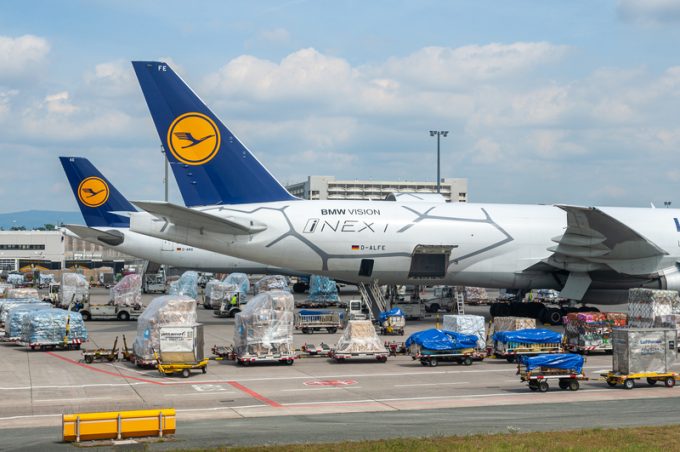Strong gains on the transpacific as US imports swell and GRIs begin to bite
Container spot freight rates on the key transpacific eastbound trade have started 2025 with strong ...
FDX: ABOUT USPS PRIVATISATIONFDX: CCO VIEWFDX: LOWER GUIDANCE FDX: DISRUPTING AIR FREIGHTFDX: FOCUS ON KEY VERTICALFDX: LTL OUTLOOKGXO: NEW LOW LINE: NEW LOW FDX: INDUSTRIAL WOESFDX: HEALTH CHECKFDX: TRADING UPDATEWMT: GREEN WOESFDX: FREIGHT BREAK-UPFDX: WAITING FOR THE SPINHON: BREAK-UP ALLUREDSV: BREACHING SUPPORTVW: BOLT-ON DEALAMZN: TOP PICK
FDX: ABOUT USPS PRIVATISATIONFDX: CCO VIEWFDX: LOWER GUIDANCE FDX: DISRUPTING AIR FREIGHTFDX: FOCUS ON KEY VERTICALFDX: LTL OUTLOOKGXO: NEW LOW LINE: NEW LOW FDX: INDUSTRIAL WOESFDX: HEALTH CHECKFDX: TRADING UPDATEWMT: GREEN WOESFDX: FREIGHT BREAK-UPFDX: WAITING FOR THE SPINHON: BREAK-UP ALLUREDSV: BREACHING SUPPORTVW: BOLT-ON DEALAMZN: TOP PICK

Lufthansa Group’s cargo customers will see a rise in the carriers’ airfreight surcharge (ASC) from 1 January, as it folds-in sustainable aviation fuel costs.
From January, fuel used for all flight departures from the EU must blend-in 2% SAF. Lufthansa Cargo and sister company Swiss WorldCargo said today they “cannot bear the increasing environmental costs of mandatory blending on their own”.
A spokesperson told The Loadstar: “It is important for us to let our customers know early on how we will deal with the additional costs caused by SAF quotas and not, for example, introduce a new, additional surcharge.”
It will use its surcharge index calculation system, which has been in effect since 2015, to monitor SAF prices and flex the surcharge accordingly. the company said the system was “flexible and fair”, with the ASC added to the net price of each shipment.
While its index mechanism is not fully explained, and the spokesperson declined to say what the possible costs could be, he added: “SAF costs cannot be separated from ‘classic’ fuel costs. Inclusion in the index does not immediately result in an increase in the ASC, since all factors of the index are taken into consideration.
“According to the ASC concept, we will pool all relevant costs, and the ASC will then be adjusted if necessary. However, an upward adjustment is more likely.”
The system will differ between countries, depending on the regulatory environment for surcharges.
The ASC is used to cover costs the carriers can’t control, such as fuel, currency and security.
Lufthansa was quick to point to other mandatory SAF requirements elsewhere in the world. It noted India, where the government is planning a mandatory quota of SAF in fuel of between 1% and 5% from 2027, and Singapore, which will require 1% SAF in all flights departing Changi from 2026, rising to 3%-5% by 2030. By then, the EU will require 6% and the UK and Japan, 10%.
Lufthansa said mandatory blending was a “crucial technological key to more sustainable flying and essential for the energy transition in aviation”.
But, it added: “The aviation industry cannot initiate a competitive SAF market on its own. A targeted policy support strategy is required. Significantly more use of SAF is only possible if its supply volumes and availability increase substantially as quickly as possible, and the prices fall accordingly.
“Biogenic SAF is currently available in small quantities and three-to-five-times more expensive than fossil fuel. A targeted policy strategy is needed to be able to meet the volumes for the blending rates and beyond.”
Using its surcharge mechanism will erase the argument over who will pay for mandatory SAF. EVP and chief product officer for Maersk Logistics and Services Narin Phol told The Loadstar last week it was difficult to pass the cost on.
“The real fundamental issue … is that the current cost difference between the sustainable solutions and the traditional one is just simply too high.
“Without regulatory [bodies] coming in and being able to resolve this to really get a bigger adoption, I think it remains an industry challenge.
“That’s exactly where the discussion should be – how do we really create enough adoption and lower the playing field, or equalise the playing field, of the two?
He said customers were not willing to pay: “At the moment, no, because the price is too high. So, who’s going to pay for it?”
It looks as if Lufthansa has found an answer to that question, and no doubt others will follow suit.
Lufthansa was one of the first carriers, in 2018, to introduce a €12 charge for paper air waybills when eAWbs became available. Other airlines followed.
Comment on this article